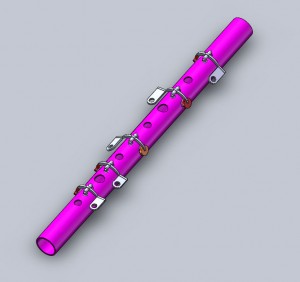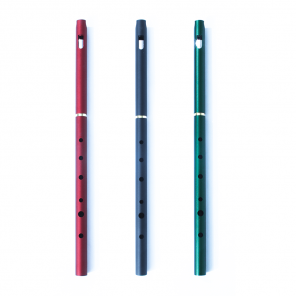MK Whistles: From Work Experience to Apprentice – by Ewen White
Whenever I talk about working at MK Whistles I always end up finding that people are much more interested in what I do than I would’ve expected. I don’t really know what my official job title is, but what I have been doing is helping with the making of the whistles, and also in the past few weeks we have been re-arranging the workshop so I was helping with jobs such as painting, re-wiring, and getting air feeds to the machines from a compressor. There are three of us in the workshop making whistles, Misha, Ronnie and myself (Ewen White).
I am often faced with the question “how did you manage to get that job?” The simple answer is; when I dropped out of university, I just asked Misha if I could have a job, and he said yes. I had done my high school work experience with him a few years before and so he had already met me and I had already done a few of the processes. A lot had changed in between my work experience and me starting my job. There were new machines, processes had been changed and three new keys of whistle had been released, with a chromatic whistle hopefully being the next product to get released.
The Chromatic whistle, nicknamed the Toob is something that Misha has had in development for over a decade. His early thoughts were the Boehm key system, which is where there’s a key for every note (like a metal flute or saxophone) although this seemed unnecessarily mechanical. The current design is the same body as a Pro low D, with keys added for the notes outwith the traditional D major scale (Ionian mode). This means that you could easily transfer from any low D to the chromatic, and all you would have to learn is using the keys. I may be wrong in saying this but as far as I am aware, this should be the first metal chromatic low D on the market.

I had always assumed that when developing the whistles, the main focus would be on the lower section of the whistle where the finger holes are. I was wrong. The positions of the holes is actually figured out using maths and then fine tweaked. Most of the development takes place on the headpiece, as this is what dictates the tone of the whistle. Misha will go through quite literally hundreds of different versions of a headpiece before he is fully happy with the tone, and even then he is still thinking of how to improve the sound. What also struck me in my first few days was how much Misha cares about consistency and quality. He has managed to fine tune the processes to maximise consistency meaning that when you buy an MK whistle, you know it will feel and sound as good as the ones that you hear the professionals playing. We have also had to sacrifice whistles for things such as defects in the anodizing, which although it won’t affect the sound or feel of the instrument, it compromises the aesthetic of the whistle and so is not fit for sale. It is these high standards that set MK apart from the competitors.
Working at MK has also been great for my own music as an accordion and Bass Player. Misha has been amazing for giving me time off for gigs, and rehearsals. I am also re-applying to university, to study music. This will hopefully go a lot better than my attempt at studying maths at university. I have a few musical projects on the go, one of which being a tour in August with a new band. This will hopefully cover most of Scotland, and will be finishing in Glasgow. I am also in the process of trying to organise a musical charity event in the summer of 2019 to raise money for sepsis which I will hopefully have more details about in the near future.









